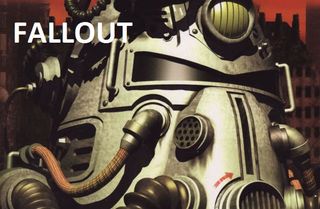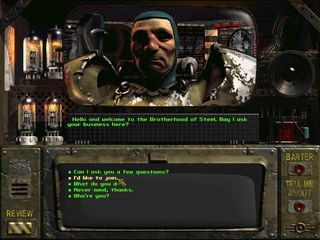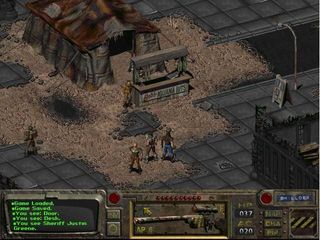
Welcome to our retrospective on the Fallout RPGs (sorry, Fallout Tactics!) released on PC (so long, Brotherhood of Steel). Here you'll find articles on each of the Fallout games, from the original through to Fallout: New Vegas.
“Maaaaaaaybe. You’ll think of me. When you are all alone…”
To me, that opening music has always been more fitting for the Fallout series than its better known growl of “War. War never changes.” It speaks so much more to what the games are, and their underlying horror—of being just a regular person suddenly ripped from at least a relatively comfortable home and thrown out into a brutal wasteland of murderers, rapists, drug-addicts and radioactive mutant horrors both friendly and hostile. There may be companions to meet along the way, but fundamentally you’re always the outsider—alone, a wanderer, trapped right on the razor’s edge between the old world’s mistakes and the new one’s salvation.
That’s something that always drew me to the series, that as bleak as it is—and it can get very bleak—there’s always a chance. It’s one of only a couple of games I can think of where you can defeat the evil mastermind by persuading him that his plan just isn’t going to work, at which point he agrees to drop it. It’s also possible to make the world a better place through careful choices and acts of compassion, such as helping to form the New California Republic and turn the technology hoarding Brotherhood of Steel into something more than just armour-plated douchebags. At the same time though, Fallout isn’t afraid of saying that sometimes, shit just happens, with the most famous example being its ending. Having mastered the wasteland, retrieved the Water Chip that your safe and secure Vault needs to continue hiding from the world, and stopped an army of supermutants… your reward is to be disowned by your former life and cast back out into the sun. As the song pointedly goes, “Maybe the one who is waiting for you. Will prove untrue. Then what will you do?”

As with most RPGs though, it’s the journey rather than the destination that dominates. Personally, I prefer the world of Fallout 2, with civilised locations like New Reno and more feel of the world having rebuilt itself rather than stagnating in a world of rust and dirt, but there’s no arguing that the first one isn’t memorable. 50s paranoia met 90s isometric graphics in a world not simply dented as beaten within an inch of its life. It’s a place full of locations with names like “Junktown” and “Boneyard” and “Necropolis”—dusty, hard places for hard people who grew up around radioactive scorpions and whole districts that glow in the dark. It’s also one built around freedom, with many ways around problems depending on choice and character build, with Fallout pioneering those now almost expected ‘what happened next’ cards before the credits rolled.
Mechanically, Fallout spent most of its development intended to show off Steve Jackson’s GURPS system, though feuding over the amount of violence it contained led to that being switched for Interplay’s homebrew SPECIAL system, where SPECIAL stands for Strength, Perception, Endurance, Charisma, Intelligence, Agility and Luck—the core stats that were combined with special perks and skills either chosen or earned. Amongst Fallout’s most eye-opening tweaks was the ability to create a character barely able of conscious thought, limited to dialogue like ‘wawa’ and annoying the living piss out of every NPC who has to talk to you.
The violence isn’t all that extreme by modern standards, but it was edgy at the time.
As you’d expect, the level of violence isn’t all that extreme by modern standards, but it was edgy at the time—the two most memorable being a “Bloody Mess” perk that specifically gave enemies the goriest deaths possible (as well as altering the ending so that after their exile, the hero silently guns down the Overseer and leaves their bisected body desperately scrabbling at the door back to safety) and targeted shots. In practice, these weren’t usually needed, but there was still nothing else quite like actively shooting an enemy in the balls.
PC Gamer Newsletter
Sign up to get the best content of the week, and great gaming deals, as picked by the editors.
Fallout was a revelation for the RPG market—not just a great game (and of course, spiritual successor to the much older Wasteland), but a post-apocalyptic playhouse. Originally it enforced a time-limit that got in the way of the action, but that was patched out (Fallout 2 pretended to have one too, but didn’t), and otherwise the freedom of the game is best summed up by the fact that you could spend hundreds of hours on it… or if you know where you’re going early on, you can conquer the whole thing in a handful of minutes. The freedom is then further helped by the depth of the world simulation—it’s not Ultima VII, but it’s pretty good, allowing for super-special-bastard techniques like pumping a character full of healthkits. When they wear off, they deal damage. Hit them with enough and it takes them out—the easy first step in an Agent 47 calibre killing.

Oddly, despite its prominence as an RPG classic, Fallout wasn’t a particularly successful game—Bethesda’s Fallout 3 was the first time the series really sold. All who played it though knew they’d touched something special, with the fanbase quickly becoming one of gaming’s most voracious. Going back to it now, well, a few issues make it a bit more challenging to play—the clunky combat, the terrible AI (even at the time, Interplay was warning prospective players “Don’t give Ian the Uzi. We mean it…”) and the other early learning steps of a new series based on a whole new way of making RPGs all take their toll. The world is also a good deal more simplistic than any of the games that followed, feeling more of an echo of them than a progenitor.
It remains a classic for good reason though, and the start of something great. With Fallout 2, the designers got to jump back in with both feet, and while its development was both rushed and torturous, most would agree the effort was worth it. It was a very different game in many ways, save of course one. Because war… war never changes.
By Richard Cobbett.
Hey folks, beloved mascot Coconut Monkey here representing the collective PC Gamer editorial team, who worked together to write this article! PC Gamer is the global authority on PC games—starting in 1993 with the magazine, and then in 2010 with this website you're currently reading. We have writers across the US, UK and Australia, who you can read about here.
Most Popular



